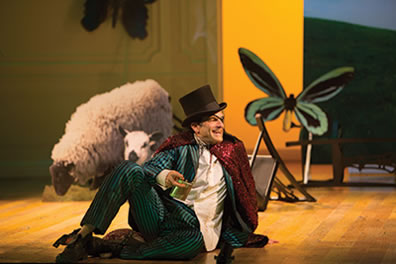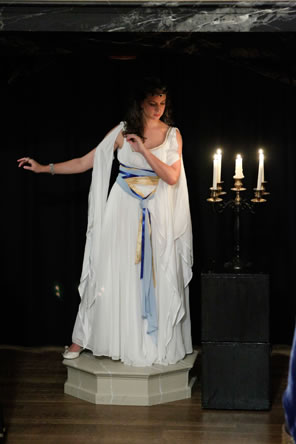The Winter’s Tale
By William Shakespeare
Written about 1611 and first printed in the 1623 First Folio
Act I, Scene 1
Archidamus has accompanied Bohemia's King Polixenes on a royal visit to his childhood friend, King Leontes of Sicilia. Camillo is a close advisor to Leontes, and the two friendly courtiers discuss Sicilia's hospitality and how it will be matched on a return visit someday to Bohemia. They also talk about Sicilia's young prince Mamillius, a "gallant child."
Act I, Scene 2
Polixenes has been visiting Sicilia for nine months, and though he's had a great time with Leontes—whom he calls his brother—he's ready to go home. They are conversing in the company of Camillo and other attendants, Mamillius, and Leontes's pregnant wife, Hermione. "Tongue-tied, our queen? Speak you," Leontes says, urging Hermione to use her charms to convince Polixenes to stay a while longer. She succeeds, and when Leontes learns this, he's pleased. But then—and I mean, with no ramp up whatsoever—Leontes believes the relationship of his wife and best friend is "too hot, too hot!" With this half line Leontes goes from being pleasurable company to internalizing a jealous rage. Playing with Mamillius, Leontes looks for himself in his son's face while reaching swift conviction that Polixenes is the father of the child Hermione is currently carrying. Polixenes and Hermione notice that Leontes is bothered by something, but he casually dismisses them. As they leave for a walk in the garden, Leontes sends off his son and calls on Camillo and tells his suspicions to the shocked advisor. As Leontes describes how Hermione and Polixenes kiss "with inside lip" and meet noses and skulk in corners, Camillo tries to talk him back to reason: "Good my lord, be cured of this diseased opinion, and betimes, for 'tis most dangerous." Instead, the king orders Camillo to poison Polixenes, and though he as much as calls Leontes crazy, Camillo agrees to do so. After Leontes leaves, Camillo says in soliloquy that he can't kill "good Polixenese" on such a spurious accusation. Polixenes enters, noting that Leontes had just now greeted him curtly, and Camillo tells him why. Polixenes is dumbfounded, but Camillo assures him that Leontes is far gone in his jealous rage and Polixenes must steal away that very night; and because Camillo is aiding in Polixenes's escape, rather than poisoning him he escapes to Bohemia with Polixenes.
Act II, Scene 1
As Hermione, near her due time, plays with Mamillius in their chambers, Leontes learns from Antigonus and other lords the full news of Polixenes's and Camillo's sudden departure. Leontes smells conspiracy and demands that the boy be removed from the queen. After Mamillius is taken away, Leontes levels his accusations at Hermione, who stoically denies them. He orders her to prison and warns everybody from speaking on her behalf—but everybody is too stunned to even move, let alone speak. Leontes reiterates his demand, but before she leaves for prison Hermione asks that, with labor soon approaching, some of her women be allowed to attend her. He grants this and she is led away. Antigonus and the other lords beseech Leontes to come to his senses and be less despotic, but he counters that he already has sent a couple of his aides, Cleomenes and Dion, to Apollo's temple in Delphos to consult the oracle on this case. Antigonus and the lords allow that this, at least, was a good move.
Act II, Scene 2
Paulina, Antigonus's wife, tries to visit Hermione in prison, but the Jailer won't let her in. However, he does allow one of the women, Emilia, to come out to speak with Paulina. Emilia tells Paulina the queen gave birth to a daughter, and Paulina determines to take the baby to the king, hoping he may "soften at the sight" of the child. The Jailer protests it's against his charge to let the baby out of prison, but Paulina convinces him that the baby, having been in the womb when the mother entered the prison, committed no crime and therefore is legally free to leave.
Act II, Scene 3
Leontes is ruminating about how he can't sleep these days—of course, he blames his wife's wickedness for that. A lord updates him on Mamillius, who has become ill. Of course, Leontes blames his wife's wickedness for that, too. Amid a hubbub of men, including Antigonus, trying to keep her away from the king, Paulina enters with the baby girl. Leontes will have none of it, and he and Paulina verbally brawl over his accusations toward Hermione. He promises to have Paulina burned; she doesn't care: "It is an heretic that makes the fire," she says. She tells him his behavior smacks of tyranny; he orders the men to get her out of his sight. She departs of her own volition, but she leaves the child behind: "Look to your babe, my lord, 'tis yours." Instead, Leontes orders Antigonus to take the baby "to some remote and desert place quite out of our dominions" and there leave it to its own protection. Crestfallen, Antigonus carries out his duty, and as he leaves with the baby, news arrives that Cleomenes and Dion are back from Delphos. Leontes orders preparation for a "just and open trial" for Hermione.
Act III, Scene 1
Cleomenes and Dion reminisce on their awesome experience visiting Apollo's temple and receiving the oracle.
Act III, Scene 2
Leontes begins the trial. Hermione is brought in and formally accused. Reminding her husband that she is "a great king's daughter" and "mother to a hopeful prince," she stands by her honor and that of Polixenes, Leontes's closest friend, in denying the charges. Nevertheless, she yields that she is ultimately powerless against this sudden, inexplicable tyranny. Leontes lists a catalog of charges: how she had sex with Polixenes, how the just-born baby belongs to Polixenes, how she knew of Polixenes's departure, how she could even be aiding Polixenes in some treasonous action even now. "Sir, you speak a language that I understand not," she replies. Leontes calls for the oracle, which is read by an officer of the court: "Hermione is chaste, Polixenes blameless, Camillo a true subject, Leontes a jealous tyrant, his innocent babe truly begotten, and the king shall live without an heir, if that which is lost be not found." Except for that last part, the oracle's verdict seems pretty clear-cut, and everybody rejoices until Leontes claims the oracle "is mere falsehood." Bad move, king. Just then, a messenger rushes in to tell Leontes that Mamillius has suddenly died. Leontes immediately repents for angering Apollo, but now Hermione collapses. All his jealous rage gone just as quickly as it had come on, Leontes calls for aid to his wife, and Paulina and the other ladies carry Hermione out. Leontes now prays to Apollo for forgiveness and promises to reconcile with Polixenes, recall Camillo, and "new woo my queen," but Paulina enters to tell Leontes that Hermione is dead.
Act III, Scene 3
Antigonus has sailed to the shores of Bohemia, where, urged by Hermione in a dream (he is certain the apparition indicates she has died), he will leave the baby, which the ghost of Hermione named Perdita. With a bad storm brewing, he lays down the baby along with a box of riches, but suddenly he has greater concerns as he exits pursued by a bear. An Old Shepherd wanders by, looking for his sheep that truant boys have run off. He finds the baby and calls for his son, a foolish fellow Shakespeare identifies only as "Clown." The young man comes in talking about what sights he's seen even now: a shipwreck in the sea and a bear eating a man on land. "Thou met'st with things dying. I with things newborn," his father says, showing him the baby, and when his son looks in the box, he declares his father "a made old man." As the Old Shepherd takes Perdita home with him, his son goes off to bury what's left undigested of Antigonus.
Act IV, Scene 1
Time enters to describe how 16 years have now passed. We leave Sicily for a bit—where Leontes has shut himself off from all society—to spend some time in Bohemia where Perdita has become a beautiful young woman and caught the attention of Florizel, son to the king of Bohemia, Polixenes.
Act IV, Scene 2
Camillo wishes to go back to Sicilia. He misses his homeland, the penitent Leontes has sent for him, and he feels he can bring some solace to the king. But Polixenes will not let him leave. He owes Cammilo his life and wants to keep repaying and has grown too accustomed to Camillo's faithful counsel, which he needs now on the matter of his son. Florizel disappears from court for days at a time and reportedly is hanging around the home of a shepherd whose estate mysteriously grew from almost nothing and who has an incomparable daughter. Polixenes decides that he and Camillo should visit the shepherd in disguise.
Act IV, Scene 3
Autolycus is a rogue thief and con artist. He also is quite the singer. Once employed by Prince Florizel, he now roams the countryside scamming fools like the Old Shepherd's son, the Clown, who comes along with a grocery list for the sheep-shearing feast his sister is hosting. Autolycus pretends to be the victim of a vicious robbery and beating by—well, by his description, a rogue thief and con artist who is very much himself. As the Clown helps Autolycus to his feet, Autolycus picks his pocket. And as the Clown tells Autolycus about the upcoming feast at his home, Autolycus plans to be there, too, anticipating quite the haul.

Mark Harelik as Autolycus at the sheep-shearing feast in the Shakespeare Theatre Company's 2013 production of The Winter's Tale. Photo by T. Charles Erickson, Shakespeare Theatre Company.
Act IV, Scene 4
Florizel is dressed as a peasant, ready to attend the feast with Perdita. Though he raves about her anatomical qualities, he proclaims full faith of love. She loves him in return but is much more sensible, recognizing that Florizel's "resolution cannot hold when 'tis opposed, as it must be, by th'power of the king." That king, as it turns out, is attending the sheep-shearing feast, along with Camillo, both in disguise accompanying the Old Shepherd. The Clown is there with two young ladies, Mopsa and Dorcas, who are rivals for his affections, and folk from neighboring farms show up, too. Perdita, as queen of the feast, welcomes especially the strangers Polixenes and Camillo, both of whom are totally smitten with her. She parlays their flirtations and continues greeting the other guests, ending with love tokens for Florizel. Then there's dancing and Mopsa and Dorcas nearly get into a fight and Autolycus shows up singing and selling ballads and other trinkets, and then a group of farmers made up as "men of hair" stop by to perform the satyr's dance—I mean, this is a party, people! And Florizel just can't contain himself anymore. He proposes to Perdita, the Old Shepherd (who thinks the young man is a well-bred stranger named Doricles) blesses the union, and the two gentlemen are asked to bear witness. One of them, though, suggests Florizel seek his own father's blessing first. Florizel, for reasons he refuses to state, says it's not meet that his father should know, whereupon that particular gentleman reveals himself as his father—and in action proves Florizel's point. Polixenes sentences the Old Shepherd to hanging for treason, Perdita to torture, and Florizel to grounding for an indeterminate number of days. After his rage abates—somewhat—Polixenes relents on the first two sentences, but threatens Old Shepherd and Perdita to stay clear of Florizel and the court. Polixenes leaves, and though Florizel stays behind, Perdita tells him to go, too. "I told you what would come of this," she says and turns to tend to her frightened father. However, he now fears that the baby he found 16 years ago was actually intended as a fairy curse rather than a blessing, so he departs, too. Florizel, though, does not leave, nor does he relent. He maintains his promise to marry Perdita against his father's will. Camillo has remained, too, and he steps forward and offers to help the couple flee to Sicilia and present themselves to Leontes. As they are making their plans, Autolycus happens by, having made the great haul of cut purses he had hoped for, and would have stolen more if the Old Shepherd hadn't come rushing in "with a hubbub against his daughter and the king's son" and scared everybody off. Camillo gets Florizel and Autolycus to exchange clothes and sends the young couple off to board a ship bound for Sicilia. Camillo then determines to tell Polixenes, who Camillo knows would then chase after and take Camillo along, allowing him a chance to return to his homeland. Autolycus is left alone, but well aware of "the business" at hand when the Old Shepherd and his son pass by. Autolycus overhears the Clown convincing his father to go to the king and tell him the truth about finding Perdita as an abandoned baby. So, Autolycus changes his disguise and manner and presents himself as a courtier who can advocate for them in court. Of course, he's got his eyes on the box the Old Shepherd is carrying, and Autolycus figures he could gain greater advancement taking the Shepherd and his son to Florizel, rather than the king, so he directs the two to the seaport and follows along.
Act V, Scene 1
Back in Sicilia, Leontes is still mourning the death of Hermione, and though Cleomines and Dion and the other lords suggest his period of grieving should end and he seek a new queen, Paulina keeps his focus ever on Hermione. "My true Paulina, we shall not marry till thou bid'st us," Leontes says. A messenger approaches with news that Prince Florizel and "his princess" have arrived to greet Leontes. Surprised at the sudden and unceremonial approach of the prince, Leontes welcomes Florizel, who claims that he comes with his father's greetings and that his bride, on whom Leontes fixates, came from Libya. They are interrupted by a second messenger who says Polixenes himself has alighted in Sicilia and sends word that Leontes should arrest Florizel and Perdita. Florizel realizes that Camillo has betrayed him (though word that Camillo is coming, too, pleases Leontes), and after explaining that Perdita is a Bohemian shepherd's daughter with whom he is truly in love, Florizel now asks Leontes to intercede on his behalf. Leontes promises to try.

Stephanie Holladay Earl holds the pose as Hermione's statue in the American Shakespeare Center's 2012 production of The Winter's Tale at the Blackfriars Playhouse. Photo by Tommy Thompson, American Shakespeare Center.
Act V, Scene 2
Autolycus, now in Sicilia, asks a gentleman about the incidents that have happened in the court there. Two other gentlemen join in the gossip, and through their accounts the full story unfolds: how the Old Shepherd revealed that he found the baby Perdita, how the artifacts he found with her confirmed Perdita as Hermione's long-lost daughter, how Leontes and Polixenes rekindled their friendship, how Polixenes embraced Florizel and Perdita as son and daughter-in-law, how Leontes and Polixenes embraced the Old Shepherd as their brother, how Florizel and Perdita embraced the Clown as their brother, how Leontes reunited with Camillo, and how the Clown confirmed to Paulina that her husband, Antigonus, was torn to pieces by a bear, and how Paulina was both newly saddened at this news but rejoicing at the recovery of Hermione's daughter. The gossips also describe a statue of Hermione by the great Italian master, Julio Romano, that is in Paulina's keeping and how Perdita especially wanted to see what her mother looked like, so the royal party is now heading to Paulina's gallery to see it. The gossips themselves hurry off to see this moment, leaving Autolycus alone to bemoan his poor timing (when he presented the Old Shepherd and his son to Florizel, the prince was more concerned with caring for the seasick Perdita) and not knowing the full story. For here comes the Old Shepherd and the Clown, dressed as proper courtiers and brothers to kings and princes, making them, they claim, gentlemen born. They promise to give Autolycus preferment—whether it sticks, we'll never know.
Act V, Scene 3
The two kings, their children, Camillo, and other lords and attendants all arrive at Paulina's house, where she draws a curtain to reveal the statue of Hermione. All remark on how lifelike it is—except that Hermione herself was not quite so wrinkled as the artist presents her. Still, she is so beautiful and the statue so real that Leontes tries to kiss it, but Paulina stops him. Then she offers to do more—a bit of magic. With music and Paulina's appeal to the statue that "'Tis time," Hermione awakens and descends, first greeting her daughter, and then reuniting with Leontes. Now that Apollo's oracle has come to fruition, Paulina says she will crawl off like some old turtle, but Leontes husbands her with Camillo instead. He then brings Hermione and Polixenes together and asks their forgiveness and introduces his wife to their son-in-law. They leave with tales of 16 years' worth of life and loss still to be told.
Comment: e-mail [email protected]
Start a discussion in the Bardroom



-sm.jpg)









 Find additional Shakespeareances
Find additional Shakespeareances